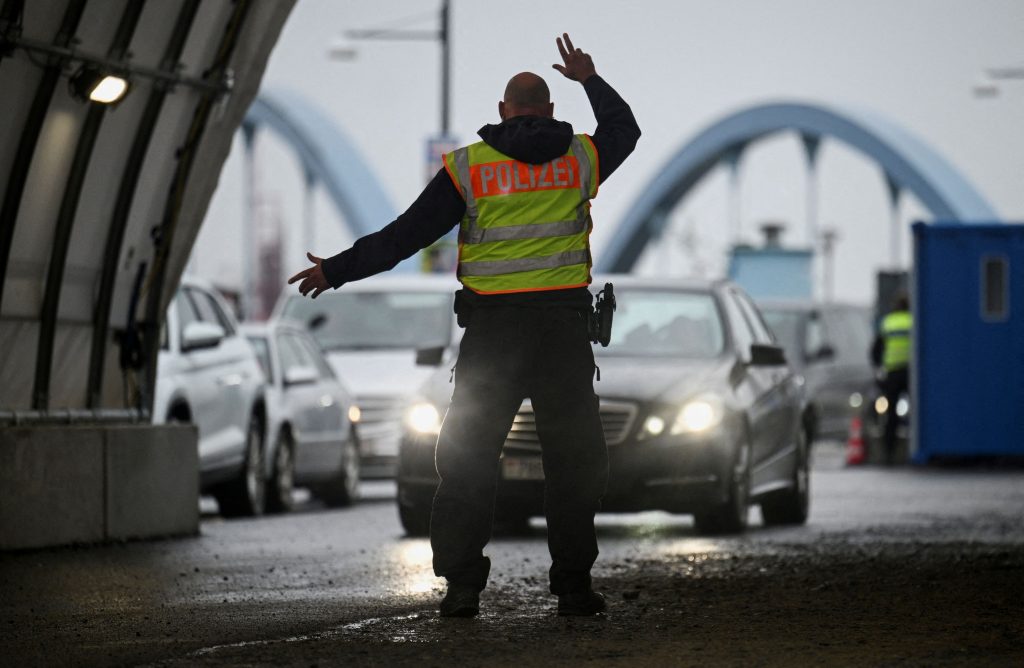Europe’s eyes were on Germany last week as the country rolled out its ‘new’ border controls. Many feared widespread disruptions in and around the country, yet by mid-week, the the new German border control measures appeared to be more ‘bark’ than ‘bite’. Yet, Germany insists important ‘work’ is being done that has already reaped results.
Germany’s unilateral decision to enforce nationwide border controls from September 16, 2024 to March 15, 2025 is aimed at reducing irregular migration, according to Interior Minister Nancy Faeser. “We want to further reduce irregular migration, stop people smugglers, put a stop to criminals, and recognize and stop Islamists at an early stage,” Faeser explained at a press conference.
However, given Germany’s sprawling 3,800-kilometer border with nine neighboring countries—and the roads, paths and train routes that crisscross them—many were left wondering how the country could manage such extensive controls effectively.
Germany’s Border Controls: Not New, But Expanded
Germany already conducted controls on its border with Poland, the Czech Republic, Austria and Switzerland, so the announcement of ‘new’ measures essentially expanded them to all of the country’s land borders.
Moreover, in response to assertions made by media and analysts that Germany’s move calls into question the future of the Schengen zone, an article in The Times of London points out that temporary border controls have been imposed within the zone 442 times over the past nine years, including during major events like the Paris Olympics.

A police officer gestures to a vehicle at a checkpoint on the German-Polish border crossing “Stadtbruecke”, as all German land borders are subject to random controls to protect internal security and reduce irregular migration, in Frankfurt (Oder), Germany September 16, 2024. REUTERS/Annegret Hilse
What’s Changed?
With the announcement, Germany’s police now have the right to conduct checks that are “targeted, adapted to the situation and flexible in terms of location and time,” according to a German border guard interviewed by German media station DW, who stressed that these were not “across the board” measures.
The same border guard told DW that a strict policing of border crossings would be impossible, as there are insufficient resources, and undesirable, because it would be too disruptive for local society and businesses.
Still, Germany’s announcement does mean that its border guards now have to right to stop any vehicle or person they consider ‘suspicious.’ Whether or not the new policy will lead to racial profiling and complaints over discrimination has yet to be seen.
Germany Claims Early Success
Faeser has defended the move, stating that similar measures in the east and south of the country have already yielded results. Since October last year, Germany says it has denied entry to 30,000 individuals, reduced asylum applications by 20%, and increased deportations of migrants without legal status.
Early reports suggest that irregular migrants have already been intercepted since the new controls were enacted, although details about their subsequent handling remain scarce.
The real test of the policy will be whether it results in tangible reductions in irregular migration in Germany, or if it simply shifts the problem to border crossings that are less closely monitored.
Reading between the lines, ELIAMEP’s Senior Research Fellow, Angeliki Dimitriadi, says Germany is targeting secondary movement and hoping to reduce the amount it pays out to refugees and asylum seekers in benefits.
The Big Picture: Refugees, Asylum Seekers and Irregular Migrants
In many ways, Germany is facing a situation similar to Greece, with both countries claiming they shoulder an unfair share of Europe’s irregular migration problem. The Migration and Asylum Pact passed by the European Union in 2023 seeks to address this imbalance. How effective it will be remains to be seen, since it has yet to be implemented.
Germany hosts one of the world’s largest refugee populations, with its 2.33 million refugees representing 2.8% of the country’s total population of 83.3 million, according to UNHCR. It also handles the highest number of asylum seekers in the EU with Germany receiving 31.4% of all first-time asylum applications in the EU in 2023—a total of 329,000 compared to Greece’s 57,900.
Across the EU, irregular migration grew by 18% in 2023 to a total of 385,445 crossings, though it still represents a relatively small proportion of overall migration. Meanwhile FRONTEX reports that irregular migration to the EU fell 30% in the first eight months of 2024. That said, the drop has not been evenly distributed because crossings surged by 193% in regions like Europe’s eastern land border, while the eastern Mediterranean witnessed a 39% increase.

epa05853852 (FILE) – A file picture dated 13 August 2015 shows an exhausted and frustated migrant holding his head after he missed to get a place on a train heading to the Serbian border at the train station in Gevgelija, EPA/GEORGI LICOVSKI
Political Implications
Germany’s move to reintroduce country-wide border controls has arrived against the backdrop of a rise in extreme right-wing political movements in the country, underscored by the AfD’s electoral victory in Thuringia, Germany—its first in the post-war period- and near win on Sunday in Brandenburg. This shift has forced Chancellor Olaf Scholz’s government to take a harder line on irregular migration.
Scholz argues that the border controls are within the bounds of European law, though he did acknowledge that Germany is “making maximum use” of its legal options – hinting that even Germany realizes their move was extreme.
Though migration isn’t officially on the agenda for the next European Council meeting in October, Germany’s move has reignited discussions behind the scenes, with several European leaders pushing for migration to be brought back to the forefront of EU policy debates.
Germany has already dispelled Greece’s fears that the new border controls will increase migrant returns to the latter, removing some urgency from the issue, but regardless, Athens is sure to welcome the renewed focus on migration, an issue it has long argued warrants more attention from Europe.







